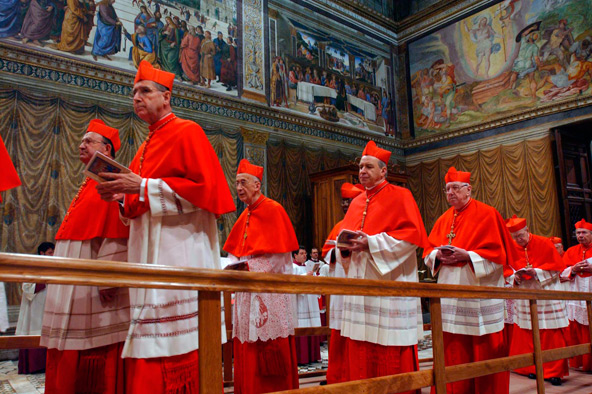
VATICAN CITY (CNS) — One task facing the College of Cardinals already has been completed: A job description for the Catholic Church’s chief evangelizer already is written.
He must be humble, but firmly grounded in church teaching; joyful and enthusiastic; willing to listen to and dialogue with others; and courageous in defending human rights, including the right to freedom of religion.
Before the cardinals enter the Sistine Chapel to begin voting for a successor to Pope Benedict XVI, they will hold meetings in the Vatican synod hall to discuss the current needs of the church.
Many of them sat in the same room for three weeks in October discussing the same thing, so they won’t be starting from scratch.
Cardinal Angelo Sodano, dean of the College of Cardinals, and 52 of the 117 cardinals who are under the age of 80 and eligible to vote for a new pope participated in the Synod of Bishops on the new evangelization.
While emphases may change when the cardinals meet after Feb. 28, it is unlikely they will try to reinvent the wheel and almost impossible that they will come up with a new topic for discussion.
The synod discussions covered the most crucial issues facing the church around the world: proclaiming the Gospel; catechesis; the meaning and role of the family; parish life; the role of new movements; liturgy and the sacraments; the clerical sexual abuse crisis; relations with other Christians; dialogue with other religions; challenges to religious freedom; the message of the Second Vatican Council; the challenges and opportunities raised by science and technology; and dialogue with nonbelievers.
The topics were seen as key elements in living the Catholic faith today.
And while no one gave a speech dedicated specifically to the administrative working of the Vatican bureaucracy and consternation caused by the “VatiLeaks” scandal that led to the arrest and conviction of Pope Benedict’s butler, synod members did discuss the values that must inspire the way the church works in the world.
The new pope will have to be the Catholic Church’s chief evangelist and, discussing the qualities an evangelist must have, synod members focused on humility, prayerfulness and a willingness to listen.
Of course, they added other qualities as well, including a thorough knowledge of Scripture and theology and an ability to communicate, whether through languages or the new media — qualities that also are on most people’s check list for a new pope.
Cardinal Luis Tagle of Manila, Philippines, told the synod that evangelizers must imitate the humility of Jesus — who was willing to become human, to suffer and to die for humanity — and the love of Jesus, particularly for “those neglected and despised by the world.”
Being humble also means recognizing when the church does not have all the answers, and therefore being willing to remain silent, he said, adding that “a church at home with silence will make the voiceless believe they are not alone.”
Polish Cardinal Zenon Grocholewski, prefect of the Congregation for Catholic Education, told the synod that the greatest obstacle a priest or theologian faces in becoming an effective evangelizer “is without a doubt pride, along with its natural ally, selfishness. The obsession with becoming great, original (and) important reduces more than a few to being ‘pastors who shepherd themselves and not their flocks,'” as St. Augustine once said.
Synod members also called for church leaders who radiate joy and enthusiasm and who are not afraid to use new media and new structures “to move from a pastoral strategy of maintenance to a pastoral position that is truly missionary.”
As Australian Cardinal George Pell told reporters during the synod, church meetings can be well-planned and faith-filled, “but we need fire, energy — that’s what the new evangelization is all about.”
“We’re in the midst of an enormous struggle between good and evil, faith and fear on a supernatural as well as a natural level,” he said. “We could do with a bit more bite.”
Before the conclave, the cardinals obviously will discuss the serious problems and challenges facing the church today. But if they follow the synod’s prescription, they will look for a leader who chooses optimism over gloom.
The synod’s final message said, “We are not intimidated by the circumstances of the times in which we live. Our world is full of contradictions and challenges, but it remains God’s creation. The world is wounded by evil, but God loves it still. It is his field in which the sowing of the Word can be renewed so that it would bear fruit once more.”
They added, “There is no room for pessimism in the minds and hearts of those who know that their Lord has conquered death and that his Spirit works with might in history.”
— By Cindy Wooden Catholic News Service





